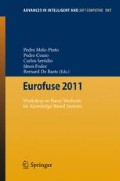Abstract
Hedges play an important role in fuzzy theory, although there are relatively few articles on them. Our aim is to provide a theoretical basis not only for hedges, but also for every type of unary operator. One of them is the negation operator, which was presented in an article [14] concerning the DeMorgan class. In our study we will develop unary operators related to other binary operators by demanding that they satisfy certain properties.
Access this chapter
Tax calculation will be finalised at checkout
Purchases are for personal use only
Preview
Unable to display preview. Download preview PDF.
References
Alsina, C., Schweizer, B., Frank, M.J.: Associative functions: triangular norms and copulas. Word Scientific Publishing, Singapore (2006)
Baldwin, J.F.: A new approach to approximate reasoning using a fuzzy logic. Fuzzy Sets and Systems 2, 309–325 (1979)
Banks, W.: Mixing crisp and fuzzy logic in applications. In: WESCON 1994 Idea/microelectronics Conference Record, Anaheim, CA, pp. 94–97 (1994)
Beliakov, G., Pradera, A., Calvo, T.: Aggregation Functions: A Guide for Practitioners. Studies in Fuzziness and Soft Computing, vol. 221. Springer, Heidelberg (2007)
Bergmann, M., Moor, J., Nelson, J.: Logic book. McGraw-Hill, New York (1990)
Bouchon-Meunier, B.: La Logique Floue. Que sais-je? vol. 2702, Paris (1993)
Calvo, T., Mayor, G., Mesiar, R.: Aggregation Operators. New Trends and Applications Studies in Fuzziness and Soft Computing, vol. 97 (2002)
Cat Ho, N., Wechler, W.: Hedge algebras: An algebraic approach to structure of sets of linguistic truth values. Fuzzy Sets and Systems 35, 281–293 (1990)
Cat Ho, N., Wechler, W.: Extended hedge algebras and their application to fuzzy logic. Fuzzy Sets and Systems 52, 259–281 (1992)
Chatterjee, A., Siarry, P.: A PSO-aided neuro-fuzzy classifier employing linguistic hedge concepts. Expert Systems with Applications 33(4), 1097–1109 (2007)
De Cock, M., Kerre, E.E.: Fuzzy modifiers based on fuzzy relations. Information Sciences 160, 173–199 (2004)
Cox, E.: The fuzzy systems handbook: a practitioner’s guide to building, using, and maintaining fuzzy systems. Academic Press Professional, San Diego (1994)
Dombi, J., Gera, Z.: On aggregative operators. Information Science, under Review Process
Dombi, J.: DeMorgan systems with infinite number of negation. Information Science (appears in 2011)
Dombi, J.: DeMorgan systems with an infinitely many negations in the strict monotone operator case. Information Sciences (accepted 2011)
Grabisch, M., Marichal, J.-L., Mesiar, R., Pap, E.: Aggregation Functions. In: Encyclopedia of Mathematics and Its Applications, vol. 127. Cambridge University Press, Cambridge (2009)
Hellendoorn, H.: Reasoning with fuzzy logic. Ph.D. Thesis, T.U. Delft (1990)
Horikawa, S., Furuhashi, T., Uchikawa, Y.: A new type of fuzzy neural network based on a truth space approach for automatic acquisition of fuzzy rules with linguistic hedges. International Journal of Approximate Reasoning 13, 249–268 (1995)
Huynh, V.N., Ho, T.B., Nakamori, Y.: A parametric representation of linguistic hedges in Zadeh’s fuzzy logic. International Journal of Approximate Reasoning 30, 203–223 (2002)
Jang, J.S.R., Sun, C.T., Mizutani, E.: Neuro-fuzzy and soft computing. Prentice Hall, Upper Saddle River (1997)
Kerre, E.E., De Cock, M.: Linguistic modifiers: an overview. In: Chen, G., Ying, M., Cai, K.-Y. (eds.) Fuzzy Logic and Soft Computing, pp. 69–85. Kluwer Academic Publishers, Dordrecht (1999)
Klement, E.P., Mesiar, R., Pap, E.: Triangular norms. Kluwer, Dordrecht (2000)
Lakoff, G.: Hedges: A study in meaning criteria and the logic of fuzzy concepts. Journal of Philosophical Logic 2, 458–508 (1973)
Di Lascio, L., Gisolfi, A., Loia, V.: A new model for linguistic modifiers. International Journal of Approximate Reasoning 15(1), 25–47 (1996)
Liu, B.D., Chen, C.Y., Tsao, J.Y.: Design of adaptive fuzzy logic controller based on linguistic-hedge concepts and genetic algorithms. IEEE Transactions on Systems Man and Cybernetics, Part B 31(1), 32–53 (2001)
Mesiar, R., Kolesrov, A., Calvo, T., Komornkov, M.: A Review of Aggregation Functions. In: Fuzzy Sets and Their Extension: Representation, Aggregation and Models. Studies in Fuzziness and Soft Computing, vol. 220 (2008)
Rubin, S.H.: Computing with words. IEEE Transactions on Systems Man and Cybernetics, Part B 29(4), 518–524 (1999)
Trksen, I.B.: A foundation for CWW: Meta-linguistic axioms. In: IEEE Fuzzy Information, Processing NAFIPS 2004, pp. 395–400 (2004)
Yager, R.R.: Approximate reasoning as a basis for rule-based expert-systems. IEEE Trans. Systems Man Cybernet, SMC 14, 636–643 (1984)
Zadeh, L.A.: The role of fuzzy logic in the management of uncertainty in expert systems. Fuzzy Sets and Systems 8(3), 199–227 (1983)
Zadeh, L.A.: Quantitative fuzzy semantics. Information Sciences 3, 159–176 (1971)
Zadeh, L.A.: A fuzzy-set - theoretic interpretation of linguistic hedges. Journal of Cybernetics 2(3), 4–34 (1972)
Zadeh, L.A.: Fuzzy logic = computing with words. IEEE Trans. Fuzzy Systems 4, 103–111 (1996)
Zadeh, L.A.: The concept of a linguistic variable and its application to approximate reasoning, parts 1. Information Sciences 8, 199–249 (1975)
Zadeh, L.A.: The concept of a linguistic variable and its application to approximate reasoning, parts 2. Information Sciences 8, 301–357 (1975)
Zadeh, L.A.: The concept of a linguistic variable and its application to approximate reasoning, parts 3. Information Sciences 9, 43–80 (1975)
Zadeh, L.A.: From computing with numbers to computing with words-From manipulation of measurements to manipulation of perceptions. IEEE Transactions on Circuits and Systems-I: Fundamental Theory and Applications 45(1), 105–119 (1999)
Author information
Authors and Affiliations
Editor information
Editors and Affiliations
Rights and permissions
Copyright information
© 2011 Springer-Verlag Berlin Heidelberg
About this paper
Cite this paper
Dombi, J. (2011). Modalities. In: Melo-Pinto, P., Couto, P., Serôdio, C., Fodor, J., De Baets, B. (eds) Eurofuse 2011. Advances in Intelligent and Soft Computing, vol 107. Springer, Berlin, Heidelberg. https://doi.org/10.1007/978-3-642-24001-0_7
Download citation
DOI: https://doi.org/10.1007/978-3-642-24001-0_7
Publisher Name: Springer, Berlin, Heidelberg
Print ISBN: 978-3-642-24000-3
Online ISBN: 978-3-642-24001-0
eBook Packages: EngineeringEngineering (R0)

